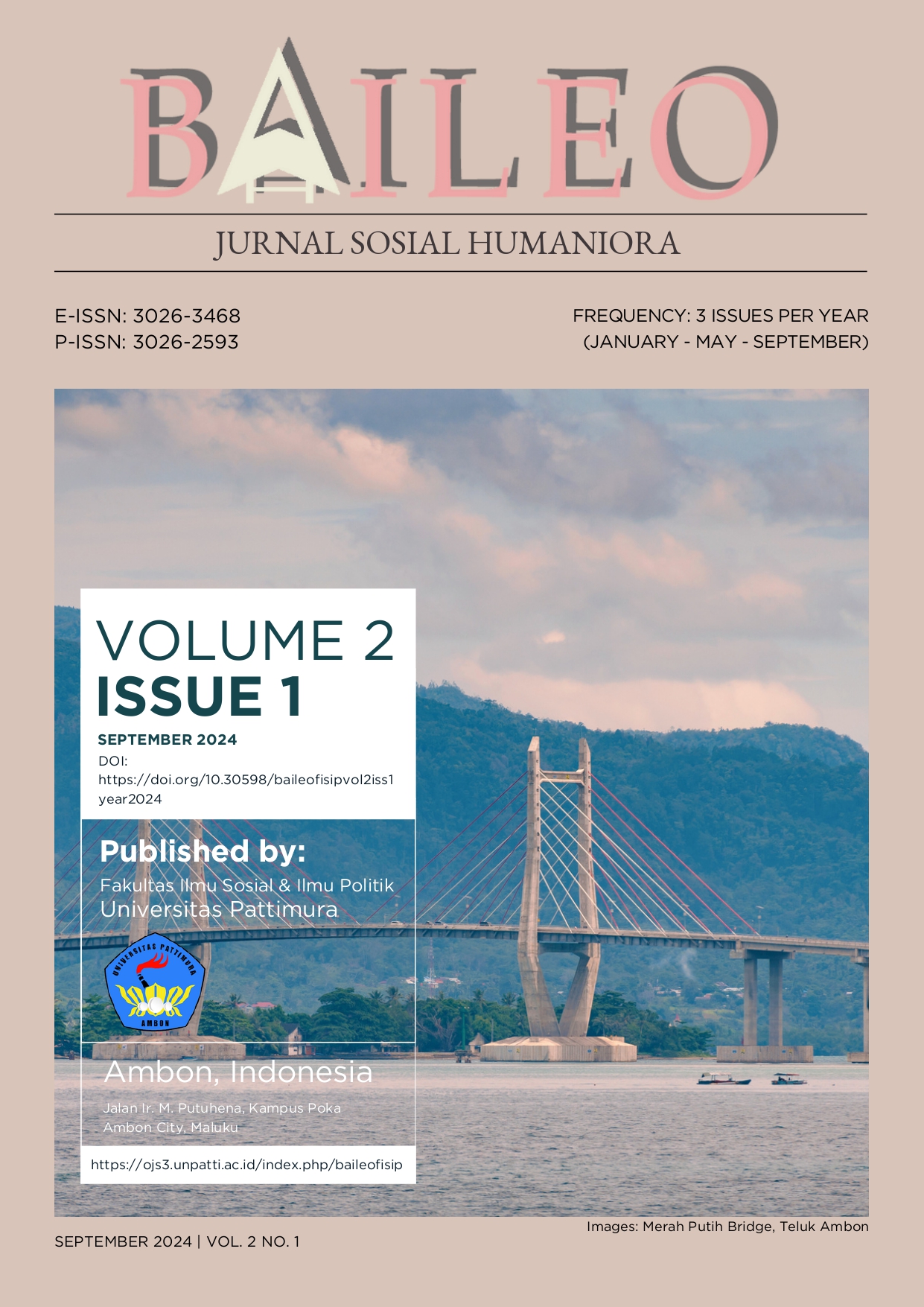Transformation of the Meaning of Njalang Tradition: From a Personal Ritual to a Medium of Preservation and Cultural Tourism Among the Nasal Clan in Bengkulu
Abstract
This study examines the transformation of the Njalang tradition among the Nasal clan in Kaur Regency, Bengkulu, from a personal spiritual ritual into a collective cultural event. Once limited to individual visits during Eid al-Fitr, Njalang has evolved into a structured mass pilgrimage involving pre-event meetings, communal services, and ceremonial activities on the second day of Shawwal. Using an ethnographic communication approach, the research involved direct participation and observation to interpret the evolving meanings of this tradition. Findings reveal that Njalang now functions not only as a spiritual practice but also as a means of strengthening social ties, preserving cultural identity, and promoting cultural tourism. This transformation illustrates how local traditions adapt to contemporary contexts while retaining core communal values. The study’s novelty lies in its focus on the transformation of meaning—an aspect often overlooked in previous research. It highlights how traditional rituals can become dynamic platforms for cultural communication and collective identity. This research contributes to the discourse on cultural resilience and offers insights for future studies on heritage preservation in the social sciences and humanities.
Downloads
References
Afdhal, A. (2023). An Examination of Traditional Customs in Minangkabau Leadership Tradition: Continuity And Changes in the Modern Era. Publicus: Jurnal Administrasi Publik, 1(2), 119–134. https://doi.org/10.30598/publicusvol1iss2p119-134
Basyar, S., Zulhannan, Z., & Muzakki, A. (2020). Islamic Characters Education Construct Of Young Generation Based On Local Cultural Values Of Lampung Indigenous Peoples. AKADEMIKA: Jurnal Pemikiran Islam, 25(1), 65–90. https://doi.org/10.32332/akademika.v25i1.1739
Choe, J., & Mahyuni, L. P. (2023). Sustainable and inclusive spiritual tourism development in Bali as a long-term post-pandemic strategy. International Journal of Religious Tourism and Pilgrimage, 11(2), 11.
Dülek, A. (2023). The Portrayal of Postmodern Socıiety and Family Dynamics in April De Angelis’ Play ‘Jumpy’: An Analysis Using Symbolic Interaction Theory, Attachment Theory and Structural Family Theory. Sosyal Bilimler Enstitüsü.
Fitria, N. J. L. (2024). Petik Laut Tradition: Cultural Resilience and Religious Practices in East Java. Multicultural Landscape, 1(1), 1–20.
Hakim, R. M. (2022). Tradisi Ngejalang di Pekon Penggawa V Tengah Kecamatan Karya Penggawa Kabupaten Pesisir Barat. Journal Of Social Science Education, 3(1), 1–15. https://doi.org/10.23960/JIPS/v3i1.1-15
Hanifah, D. U., Makruf, I., & Qosim, M. N. (2023). Pentingnya Memahami Makna, Jenis-jenis makna dan Perubahannya. Jurnal Ihtimam, 6(1), 157–171. https://doi.org/10.36668/jih.v6i1.483
Hefner, R. W. (2021). Hindu Javanese: tengger tradition and Islam. Princeton University Press. https://doi.org/10.2307/j.ctv18zhf5s
Hernandez, O. (2024). A Symbolic Interactionism’s Perspective of the Attack on the US Capitol.
Hidayat, R., Setiyaji, I., & Afdhal, A. (2023). Ruangrupa Community as an Alternative Urban Cultural Social Space. Indonesian Journal of Sociology, Education, and Development, 5(2), 64–77.
Jan-Petter, B., & Gumperz, J. J. (2020). Social meaning in linguistic structure: Code-switching in Norway. In The bilingualism reader (pp. 75–96). Routledge. https://doi.org/10.4324/9781003060406-12
Japarudin, J. (2021). Islam dan Budaya Lokal dalam Tradisi Tabut. Penerbit Samudra Biru (Anggota IKAPI).
Kurniawan, H. (2023). Batik Pahakh : the Transformation of Tradisional Tool in the Ngejalang. Jurnal Internasional Seni Budaya, 3, 31–42.
Lauristin, M., & Vihalemm, P. (2020). The political agenda during different periods of Estonian transformation: External and internal factors. In Estonia’s Transition to the EU (pp. 1–27). Routledge. https://doi.org/10.4324/9781003061243-1
Madden, R. (2022). Being ethnographic: A guide to the theory and practice of ethnography. https://doi.org/10.4135/9781036211509
Manalu, R. (2023). Inculturation of Catholic Religion in Javanese Culture: A Study of Pilgrimage Tourism Experience in the Ganjuran Church, Bantul, Special Region of Yogyakarta. Tour. J. Pariwisata, 4(1), 1. https://doi.org/10.22146/gamajts.v4i1.82945
Polnaya, T., Murwani, P., & Pariela, T. D. (2023). Transformasi Budaya dan Interaksi Sosial dalam Masyarakat Adat: Dampak Masuknya Teknologi Digital. Baileo: Jurnal Sosial Humaniora, 1(1), 1–14. https://doi.org/10.30598/baileofisipvol1iss1pp1-14
Pung, J. M., Gnoth, J., & Del Chiappa, G. (2020). Tourist transformation: Towards a conceptual model. Annals of Tourism Research, 81, 102885. https://doi.org/10.1016/j.annals.2020.102885
Ridwan, M., Toisuta, H., Sulaeman, S., & Salam, N. (2020). The abda’u ritual: Ethnographic communication study of Tulehu society in the Moluccas, Indonesia. International Journal of Criminology and Sociology, 9, 709–722. https://doi.org/10.6000/1929-4409.2020.09.67
Roux, J.-L., Konczal, A. A., Bernasconi, A., Bhagwat, S. A., De Vreese, R., Doimo, I., Marini Govigli, V., Kašpar, J., Kohsaka, R., & Pettenella, D. (2022). Exploring evolving spiritual values of forests in Europe and Asia: a transition hypothesis toward re-spiritualizing forests. Ecology & Society, 27(4), 1–20. https://doi.org/10.5751/ES-13509-270420
Sari, I. N., Lestari, L. P., Kusuma, D. W., Mafulah, S., Brata, D. P. N., Iffah, J. D. N., Widiatsih, A., Utomo, E. S., Maghfur, I., & Sofiyana, M. S. (2022). Metode penelitian kualitatif. Unisma Press.
Sholehuddin, M. S., Munjin, M., & Adinugraha, H. H. (2021). Islamic tradition and religious culture in halal tourism: empirical evidence from Indonesia. IBDA: Jurnal Kajian Islam Dan Budaya, 19(1), 79–100. https://doi.org/10.24090/ibda.v19i1.4470
Trillò, T., Hallinan, B., & Shifman, L. (2022). A typology of social media rituals. Journal of Computer-Mediated Communication, 27(4), zmac011. https://doi.org/10.1093/jcmc/zmac011
Copyright (c) 2024 Andriyanto Andriyanto, Dhanurseto Hadiprashada, Mas Agus Firmansyah

This work is licensed under a Creative Commons Attribution 4.0 International License.




